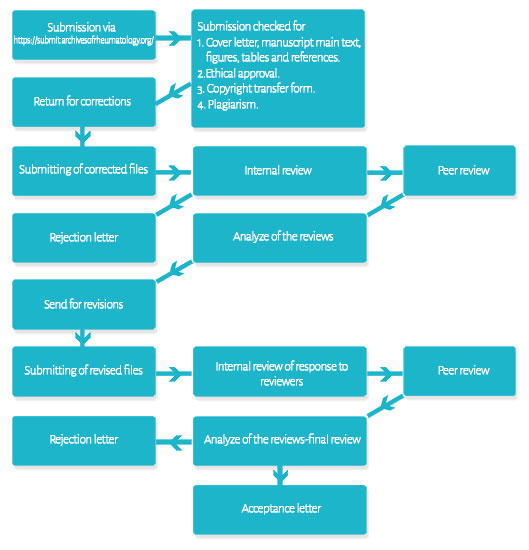Instructions to Reviewer

Peer review workflow
Detailed, unbiased and evidence-based reviewer comments are essential for fair decisions to accept, revise, or reject submissions to the Archives of Rheumatology. All research and review articles are subject to double-blind peer-review by properly selected specialists with interest in the subject matter and reviewer skills.
The aim of the review process is to check scientific quality, novelty, implications of the submissions, validate format and references, and comment on all aspects related to research and publication ethics.
As a rule, our responsible editors select and appoint at least 2 external reviewers for commenting on an average submission. The Editor-in-Chief along with Associate Editors make a decision based on comprehensive evaluation of reviewer comments and recommendations on suitability of the submissions for publication.
After the first internal review, the editor can reject the manuscripts which are not in the scope of the journal or not suitable for peer review according to incompliance to the editorial policy.
Accepting or declining invitations
Reviewer invitations are sent to selected experts through the online submission system. Potential reviewers receive emails to accept or decline the invitations and make a decision by clicking on corresponding links in the emails. If they agree to review, they notify the editors within five (5) days. If the editors do not receive a reply from the invited peers within that timeframe, other experts can be assigned.
When the invited peers receive an invitation but feel busy, engaged with other assignments or consider the topic of the submission out of their expertise, they are requested to decline the invitation as soon as they receive the email by clicking a related link.
Disclosures
Reviewers are asked to disclose any potential financial or nonfinancial conflicts of interest that may prejudice their professional comments and recommendations. More about conflicts of interest can be found at http://www.icmje.org/conflicts-of-interest/
Peer review timeframe
We ask our reviewers to submit their comments within twenty one (21) days after accepting the assignment. In case they need an extension of the date or unable to complete the review, related notification sent to the editorial office is greatly appreciated.
All reviewer comments must be submitted to the online editorial system. Comments should not be sent by emails to the editorial office. However, in case of any difficulties with the submission system our technical editors can be contacted to help.
Confidentiality
The reviewers should keep each manuscript they assigned to comment in strict confidence without disclosing related information to anyone.
Reviewers should not cite the work under review and should refrain from using the information to advance their own research before publication.
Reviewers remain anonymous throughout the peer review and the publication of the article.
Tips for reviewers
A good review has two goals: 1. to help the handling editors make a decision about the manuscript and 2. to advise the authors how to correct, revise, and improve their work. In their comments reviewers reflect on the following questions.
- Is the manuscript methodologically sound, and the data support the conclusion?
- Has the statistical analysis been performed appropriately and rigorously?
- Is the manuscript presented in an intelligible fashion and written in standard English?
- Is there any research or publication ethics issue?
Writing comments to authors
Reviewers should keep in mind that they are the authors’ allies and aim to promote effective and accurate scientific communication. They should be
- Constructive– Stating that a section needs work may not be helpful to the author; add details about what could be altered to improve the section or manuscript.
- Clear- While reviewers provide detailed comments, they should be precise about what they expect from the authors.
- Positive – The authors are looking for helpful suggestions appreciating the work done and aiming to minimize weaknesses of their research and writing. Polite language is welcome while personal insults and harsh tone of the comments are absolutely unacceptable.
- Identify Strengths– It is important to let the author know what should not be changed as well, this way they save time for the revision process
Reviewers should not list any recommendations on suitability for publication in comments conveyed to authors.
Comments to Editors
Reviewers have to send comments to the Associate Editor when reviewing a manuscript. If they have any concerns about the manuscripts or their professional interest in the field, the Editors should be notified confidentially.
Decisions on Submissions
Revisions
After an author submits a revision, the Editor will ask the reviewer(s) of the previous round of the review to evaluate the revised submission. If a reviewer asks for revisions, we expect their commitment to act as reviewers for consecutive rounds of the peer review.
Final Decision
The final decision on a submission is made by the Editor-in-Chief. The Scientific Editor will use reviewer comments and decisions, the criteria for acceptance, and their own editorial assessment of a paper to make their final decision.
Address
Yaşam Caddesi No: 13/A Neorama Plaza Kat:6 Daire:26 Söğütözü/Ankara, Türkiye.
Phone: +90 312 562 13 22
Fax: +90 312 562 13 22
Web Address: www.archivesofrheumatology.org
Permission Requests
Permission requests to reproduce copies of articles for non-commercial use may be obtained from the Editorial Office.
Editorial Contact
Meltem ALKAN MELİKOĞLU, MD, Professor
E-Mail Address: mamelikoglu@gmail.com
Abdulvahap KAHVECİ, MD, Asst Professor
E-Mail Address: abdulvahap_kahveci@hotmail.com
Technical Contact
Çiğdem ERATAK
Yazılım Parkı Bilişim Teknolojileri D.O.R.P. Ltd. Şti.
E-Mail Address: ceratak@yazilimparki.com.tr
Web Address: www.yazilimparki.com.tr
